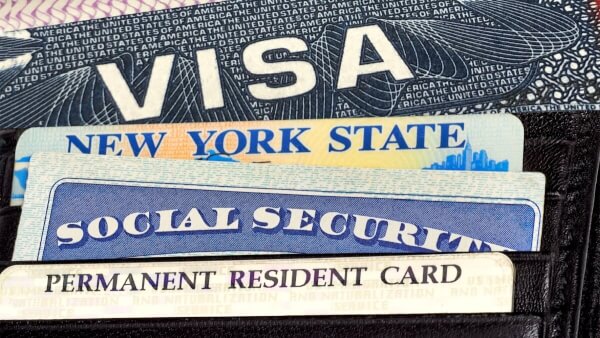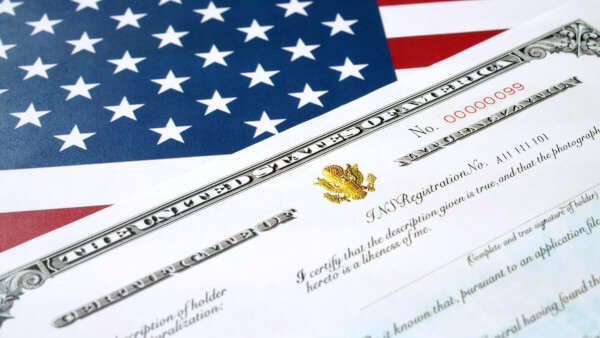Transferring your international driver's license to the US: step-by-step
Your full guide to updating your foreign driver's license to the US.

Dual citizenship may apply if you naturalize as a US citizen, or as a result of where you’re born and where your parents are originally from. US dual citizenship means you’re subject to both American laws, and the laws of your alternate country of citizenship. While there are strong advantages to being a dual national, there are also some challenges.
If you’re interested in how to get dual citizenship, or what dual citizenship really means in the US, read on. And don’t forget — if you’re a dual national or live an international lifestyle, you need Wise for low cost currency exchange and cross border payments.
| 📑 Table of Contents |
|---|
Dual citizenship — also known as dual nationality — is where an individual is simultaneously a citizen of 2 different countries. As a dual citizen you have rights and responsibilities in both countries of citizenship, and owe allegiance to both nations¹.
People may be dual citizens from birth, or become dual nationals at a later stage. For example, a child born abroad to parents who are US citizens may be both a US citizen by virtue of his parents, and a citizen of the foreign country due to the laws in place there. Children whose parents are from 2 different countries may be entitled to dual citizenship. Adults who choose to naturalize as a citizen of a different country may also retain their original nationality to become dual citizens.
Dual citizenship can be complex. Dual nationals are subject to the laws of both of their countries of citizenship, which can at times cause conflict. However, there are also advantages to dual citizenship which we will explore next.
Now you know what dual nationality is, let’s take a look at some of the reasons people might choose to seek out dual citizen status:
|
|---|
Like with most things, holding dual citizenship isn’t all good news. There is also a notable list of downsides you’ll need to consider if you’re thinking of applying to become a dual citizen. Here are some important points to know:
|
|---|
Dual citizenship is allowed in the US. If you become a US citizen you are not compelled under US law to relinquish your original nationality. However, depending on the rules and laws in your original country of citizenship, you may be required to give up that nationality when you take on US citizenship⁴.
Make sure you check out the full details for your nationality through your local embassy or consulate before you start the journey to becoming a US citizen.
In basic terms dual citizens have both rights and responsibilities in both of their countries of citizenship. It’s even possible to hold more than 2 citizenships, which can further increase the opportunities and challenges involved.
Here are a few of the rights and responsibilities in the US you should be aware of if you’re thinking of naturalizing as a dual citizen:
| Rights as a dual citizen of the US | Responsibilities as a dual citizen of the US |
|---|---|
|
|
There are 4 key routes to US citizenship:
1. Citizenship by birth if you’re born in the US
2. Citizenship based on being born to parents who are US citizens
3. Citizenship because your parents naturalize as US citizens while you’re still a minor
4. Citizenship by naturalization
In all cases you could, technically, be or become a dual citizen. Here’s where it gets a little complex.
If you’re a citizen of the US based on being born on US soil, you may also be entitled to apply for citizenship of another country if you are eligible because of your heritage. For example, you might be able to take on Irish citizenship if one of your grandparents were born in Ireland, even if you’ve never actually visited the Emerald Isle.
If you’re a US citizen based on your parents being US citizens themselves, you may be entitled to a second nationality if you’re born abroad somewhere which confers citizenship to anyone born in the country.
If you become a US citizen because your parents naturalized when you’re a child, you do not necessarily need to give up your original nationality, making you a dual citizen. And finally, if you’re in the US as a Green Card holder you may be able to naturalize as a US citizen after 3 or 5 years depending on your situation. If the country of your original citizenship allows it, you may retain that nationality, and become a dual citizen.
Triple citizenship — sometimes described as multiple citizenship — isn't banned by law in the United States⁵. You don’t need to give up previous nationalities to become an American citizen. That means that, if you already hold dual dual citizenship elsewhere, and apply for American citizenship too, it shouldn’t cause you a problem, as long as you fulfil all the eligibility requirements to become an American by naturalisation.
In most cases it’s not possible to ‘collect’ citizenships without hitting a practical ceiling. There are a couple of reasons for this — firstly some countries won’t allow you to become a naturalised citizen without giving up your original nationality.
And secondly, some countries will strip you of your naturalised citizenship if you no longer live in the country. That means that if you move away for long enough to fulfil the residency requirements of another country, you could end up having the original citizenship automatically revoked. That’s the case with Irish naturalised citizenship, for example⁶. So although there may be no legal limit to the number of nationalities you hold, there are pragmatic reasons why you might not be able to go on acquiring citizenships forever.
Anything concerning immigration tends to be complex and bound by a whole bunch of laws and regulations. And dual citizenship is no exception. If anything, it’s exceptionally complicated because you need to take into account the laws of at least 2 different jurisdictions.
Taking legal and professional advice before you become a dual citizen is a smart move — check you understand the implications for tax, your obligations as a citizen of both countries, and any likely challenges you might face before you get started. In the meantime, here are the answers to a couple of common questions about dual nationality, to kickstart your research.
As we’ve mentioned, the US does not stop its citizens becoming dual nationals, either through naturalization or the laws in the second country. However, that doesn’t mean you can become a dual citizen wherever you choose. Some countries do not recognize dual nationality, and as such you’d have to rescind your original nationality to take on US citizenship.
Countries which allow dual citizenship with the US without any barriers include Canada, the UK and Mexico. Some countries which do not allow dual citizenship with the US include China, India and Singapore. There are then a third subset of countries which may automatically strip citizens of their nationality if they naturalize elsewhere, but then offer a way to regain it. The Philippines and Vietnam fall into this category.
If you’re not sure whether or not you’re eligible for dual citizenship with the US, check with your local embassy or consulate.
Dual citizens are entitled to hold passports from both countries in which they are citizens. This can be handy if your passport offers extensive visa free travel opportunities — like the US passport does.
You’ll need to understand the rules for travel which are, in part, based on which countries you hold citizenship in. For the US, you must always enter and leave the US on your US passport if you hold one. Other countries may require you to use their passport to enter and exit in the same way, or might even put additional requirements in place, such as getting an exit visa before departing the country.
| 💰 Juggling life between two countries? Make sure to try Wise. A quick, cheap and transparent way of sending money abroad. Have your money with you wherever you are and easily convert between currencies using the mid-market rate. |
|---|
What you need to do will depend a lot on your home country, and the law there about dual citizenship. Your best option is to check if you have a duty to inform your home country of your intentions, with either an immigration lawyer or through your local embassy or consulate.
Getting dual citizenship can open a number of doors. If you’re planning on naturalizing as a US citizen, you’ll definitely want to check out whether you’re entitled to hold dual nationality, and what that might mean for you.
Dual citizenship isn’t all plain sailing of course. It can be a complex process to establish your dual nationality, and because you have responsibilities in both countries this may cause some conflict or extra admin to complete down the line. However, becoming a dual citizen when you naturalize in the US does give you the opportunity to retain your links to your country of birth, as well as forging a new future in the US. Use this guide to start your research, and see if dual citizenship is a possibility for you.
Sources:
Sources checked on 08.27.2021
*Please see terms of use and product availability for your region or visit Wise fees and pricing for the most up to date pricing and fee information.
This publication is provided for general information purposes and does not constitute legal, tax or other professional advice from Wise Payments Limited or its subsidiaries and its affiliates, and it is not intended as a substitute for obtaining advice from a financial advisor or any other professional.
We make no representations, warranties or guarantees, whether expressed or implied, that the content in the publication is accurate, complete or up to date.

Your full guide to updating your foreign driver's license to the US.

Whatever your reason is for moving to the US, this guide aims to help you figure out the most important costs you'll face when you live there.

Find all you need to know about getting a personal loan for H-1B visa holders in this guide.

Everything you need to know about the US certificate of naturalization.

The US welcomes large numbers of new arrivals every year — and getting a great job to both gain experience and set down roots is a core part of the American...

Find everything you need to know about the US citizenship test, including the USCIS questions and answers.